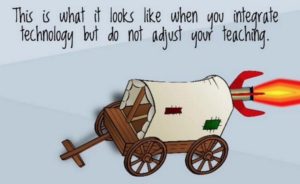“Less is More” – School document organisation
The transition from a school based server to a cloud based solution like G-Suite (formerly Google Apps for Education) can take many forms – in order that all staff experience positive outcomes from the outset, I have discovered a few strategies, that seem to work well. These suggestions rely on identifying whether the server based document is “dynamic” or “static”.
Examples of “dynamic” documents could include things like forms to apply for leave, RAMs forms, SEN student referral forms, reporting Health and Safety concerns/incidents.
Many teachers would historically have made copies of the (school server based) dynamic documents and filled them out and then emailed them or printed them for the recipient to process. Not a good use of anyone’s time or energy.
Examples of “static” documents could include things like BoT policies, staff handbook documents, guidelines for EOTC events etc.
Many teachers would have struggled to find (school server based) static documents and when they did find them, they may have made copies and/or printed them out. The chaotic nature of many school servers meant that the finding process was often challenging and the “up to date-ness” of the documents were often questionable.
Moving away from a school based server to G-Suite can deliver many instant advantages for teachers – however, the “hangover habits” outlined above can take some time to eliminate unless they are replaced by some very effective strategies that work for everyone, by saving time and enhancing collaboration, communication and creativity.
Before sharing some of the strategies that work, let’s identify some of the strategies that do not work – these need to be eliminated as the new strategies are implemented:
Some examples (of many I could list) that don’t work:
- Some documents stored in Google and some stored on school server
- Some documents stored in both Google and School server
- Some documents moved from School server to Google with no thought as to how fit for purpose they might be
- Copying everything from School server to Google overnight, without strategies and training to support teachers.
- Uploading Word docs into Google, without conversion to G Doc format
- Poorly formatted Word docs converted into Google docs with sub optimal outcomes
If your school is experiencing some or any of the above, the good news is that help is at hand – predictably, it’s a 3 stage process:
- Audit of docs and drives and a plan developed and implemented to re-design, re-purpose and to store them so that accessibility markedly improves
- Training for all staff, including Admin staff and Senior leaders
- Ongoing monitoring, celebration of wins and feedback as to how to further improve systems and processes
Here are a few examples of how documents can be optimised/redesigned during the transition process:
| Type of Doc | Examples | Advice | Strategies |
| Static |
Docs that make up Staff handbook BoT Policies PLD resources Minutes/agendas |
Avoid at all costs |
Having lots of documents Using Word or Publisher Poor layout/choice of fonts etc Making a new Google doc for each meeting minutes Random filing Ambiguous file/folder naming |
| Think about |
Significantly reducing number of docs Combine into single G Doc with hyperlinked index Convert to G Docs Consistent choice of layout/font etc Use Google templates for new docs Use one Google doc per term for team/staff minutes Use Team Drives wisely |
||
| Dynamic |
Leave application RAMs forms SEN student referral forms Reporting Health and Safety concern/incident Teacher planning docs Appraisal evidence |
Avoid at all costs |
Converting everything from Word to G Docs No appraisal evidence should have to be uploaded/downloaded |
| Think about |
Using Google Forms or sheets (esp for planning) Link these docs to things like staff handbook and staff landing page/intranet All appraisal evidence should be hyperlinked |
All of the above are just some examples of how wisely schools are using G-Suite to save time and stress for everyone. There are many more examples, of course – all of which are dependant on training for staff that is “Meaningful, Memorable and Motivating”.


Recent Comments